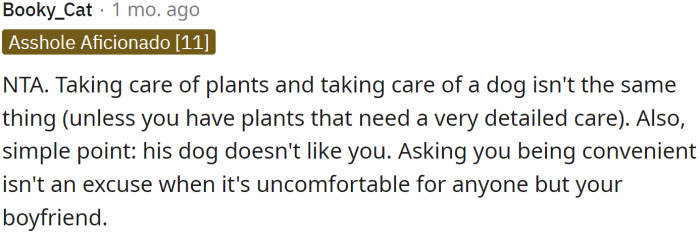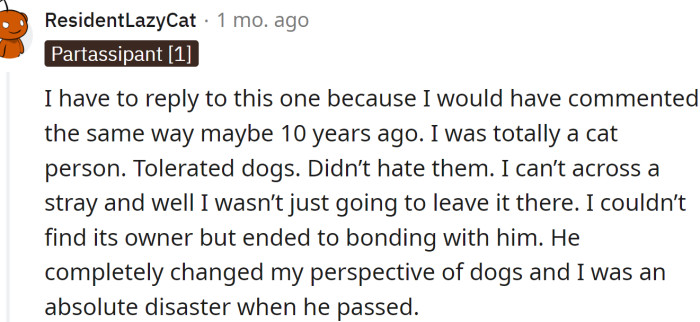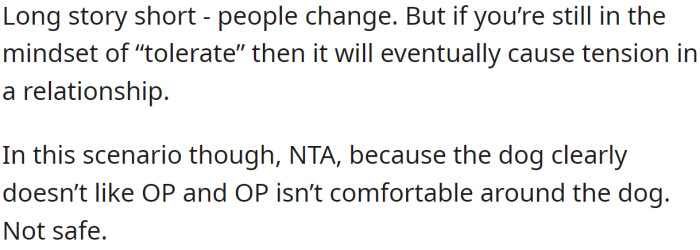Redditor's BF Insists She Pet Sits His Dog That's Aggressive to Her
Pet ownership is a significant responsibility that comes with many obligations, such as providing adequate food, water, exercise, and medical care. One of the most important responsibilities of pet ownership is ensuring proper care for our pets while we are away from home.
This can be a difficult task, as leaving our pets alone for an extended period can be very stressful for them. Fortunately, there are a variety of pet care services that can help us find adequate care for our pets while we are away.
Professional pet sitters, for example, can provide in-home care services, such as feeding, cleaning, and walking. They can also offer companionship and playtime, which can help alleviate any feelings of loneliness or anxiety.
Boarding facilities are another option, providing a safe and secure environment for our pets while we are away. In addition, these facilities often offer additional services, such as grooming and medical care.
However, these services are not cheap. Therefore, the best solution is to find someone to do it for free.
But what if that person doesn't like your pet? OP is not a dog person and does not particularly like her boyfriend's dog.
The canine is incredibly clingy and protective of him and barks whenever OP is around. When her boyfriend had to go away for work training, he asked OP to dog-sit since she had free time, and he had taken care of her plants when she had to isolate somewhere else due to COVID.
He was willing to find someone else and pay for it but thought OP should be nice and do it for a few days. OP is wondering if she is the A-hole (AITA) for not wanting to do it.
OP asks:

OP is not a dog person and does not particularly like her boyfriend's dog. But he insists she watches his dog while he is away.

OP has offered the following explanation for why they think they might be the A-hole:

Understanding Aggressive Dog Behavior
The situation involving aggression from a pet often reflects underlying behavioral issues that can stem from a variety of factors, including lack of training, socialization, or past trauma. Research from the Journal of Veterinary Behavior indicates that dogs displaying aggression often do so out of fear or anxiety, rather than inherent malice.
Understanding the root causes of aggressive behavior is essential for creating a safe environment for both the dog and the individuals interacting with them.
In this case, the Redditor's discomfort with the boyfriend's dog could be a protective response driven by a natural instinct to avoid potential harm.
Understanding Behavioral Dynamics with Aggressive Pets
Dr. Natalie Brooks, a veterinary behavioral specialist, points out that living with an aggressive dog can lead to significant emotional distress for both the pet and its owner.
Her research indicates that fear-based aggression can stem from past trauma or inadequate socialization.
Understanding the underlying causes of aggression can help owners navigate these challenges more effectively.
If the dog doesn’t like OP, she might not be safe

This situation is not comfortable for anyone, except her BF

OP replies

Additionally, the dynamics of pet ownership can complicate romantic relationships. A study from the Journal of Social and Personal Relationships indicates that differing attitudes towards pets can create tension between partners.
When one partner insists on a certain behavior, such as pet-sitting an aggressive dog, it can lead to feelings of frustration and resentment in the other partner, as they may feel their emotional comfort is being compromised.
Recognizing these dynamics can help both partners navigate their feelings and find common ground.
According to studies published in the Journal of Applied Animal Behavior Science, aggressive behavior in dogs often reflects their emotional state and can be managed through appropriate training and environmental modifications.
Recognizing the triggers of aggression is essential for developing a successful management plan.
This approach can help mitigate fear and promote a safer living environment for everyone involved.
Relationships between dog people and those who don't like dogs are difficult to maintain

It seems that OP doesn't have a problem with dogs in general - just this particular dog

This Redditor shared their experience:

Communicating Boundaries in Romantic Relationships
Effective communication about boundaries is crucial in relationships, especially when it involves pets. Research in the field of relationship psychology suggests that discussing personal comfort levels can significantly enhance relationship satisfaction.
In this scenario, the Redditor could benefit from articulating their concerns about the aggressive dog, framing the conversation around their feelings rather than blaming the boyfriend.
This approach can help foster empathy and understanding, making it easier to reach a compromise.
Strategies for Managing Aggressive Behavior
Experts recommend consulting with a professional dog trainer or behaviorist for tailored strategies to address aggression in pets.
Research shows that positive reinforcement techniques can lead to significant improvements in behavioral outcomes.
Creating a structured routine can also provide a sense of security for the dog, reducing anxiety and aggressive behaviors.
But they agree that this situation is not safe for OP

The bottom line is:

Boundaries

To address the situation, exploring alternative arrangements for pet care could be beneficial. Research indicates that flexibility in caregiving roles can enhance relationship satisfaction and reduce conflict.
Discussing options such as hiring a professional dog sitter or finding a trusted friend to look after the dog can create a win-win situation for both partners, allowing them to express their needs while ensuring the dog's safety.
Encouraging collaborative problem-solving can strengthen their relationship while addressing the needs of all parties involved.
From a cognitive-behavioral perspective, understanding the owner's emotional responses to the dog's aggression is crucial.
Research indicates that fear and anxiety in owners can inadvertently reinforce aggressive behaviors in pets.
Addressing these emotional responses can lead to more effective management of the dog's behavior.
You don't have to read the whole post to reach a conclusion

OP responded. And she is right. Personal safety is a major limit

No matter which pet care service we choose, it is important to do our research and ensure that our pet is in safe and reliable hands. This means asking questions about the pet care provider’s experience and qualifications, as well as the services they offer.
Finding proper care for our pets while we are away is a crucial part of pet ownership. Additionally, not making people who don't like your dog take care of it is an important aspect of maintaining healthy relationships.
Practical Solutions for Coexisting with Aggressive Pets
Experts suggest establishing clear boundaries within the home to create a safe environment for both the pet and the owner.
Research indicates that having structured routines can help reduce anxiety and promote stability for aggressive dogs.
Regular training sessions that focus on positive behaviors can also improve the bond between the owner and the dog.
Ultimately, addressing aggression in pets requires a holistic approach that considers both the animal's needs and the owner's emotional state.
Encouraging self-care practices for the owner can enhance their ability to manage stress and respond effectively to the dog's behavior.
Creating a supportive environment is essential for fostering positive behavioral changes.
Psychological Analysis
This situation illustrates the complexities of living with an aggressive pet and the emotional challenges it poses for the owner.
It's essential to approach these issues with empathy and understanding, recognizing the impact of both the pet's behavior and the owner's emotional state on the overall dynamic.
Analysis generated by AI
Analysis & Alternative Approaches
In conclusion, managing aggressive pets requires understanding the emotional dynamics at play for both the owner and the animal.
By implementing structured training, setting clear boundaries, and addressing emotional responses, owners can create a safer and more harmonious living environment.
Ultimately, fostering a supportive and informed approach can lead to significant improvements in behavior and overall well-being.
Analysis & Alternative Approaches
In conclusion, navigating the complexities of pet ownership within romantic relationships requires effective communication and mutual understanding.
Research suggests that recognizing and addressing differing comfort levels can enhance relationship satisfaction and reduce conflicts.
By fostering open dialogue and exploring collaborative solutions, both partners can work toward a harmonious living environment for themselves and their pets.



